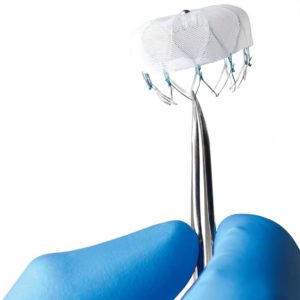A new device can help prevent stroke in patients with atrial fibrillation
Approximately a quarter of all strokes can be attributed to atrial fibrillation (also known as AFib or AF), a condition where the heart quivers or has an irregular heartbeat. Patients with AF have an increased risk of stroke and are often treated with strong blood thinners, such as Coumadin or Warfarin, to reduce this stroke risk. Now, Kootenai Heart Clinics Northwest is the first in the Inland Northwest to use a new procedure for stroke prevention, providing an alternative to blood thinners. Only 100 centers nationwide are approved to implant this new device. Dennis Cooke, M.D., Timothy Lessmeier, M.D., and Michael Williams, M.D., make up the three-cardiologist team that is currently implanting the Watchman.
 HOW IT WORKS
HOW IT WORKS
During atrial fibrillation, the upper chambers of the heart (the atria) no longer beat effectively—they quiver. This quivering of the heart allows blood to collect and sit in an area called the left atrial appendage, causing clots to form. If these clots are released, the patient can have a stroke.
“I would say about 90 percent of strokes in patients with AFib are caused by these clots coming from the left atrial appendage,” said Dr. Cooke, interventional cardiologist with Kootenai Heart Clinics Northwest. “Blood thinners can be used to prevent these clots from forming, but these blood thinners come with risk factors of their own, including bleeding.”
The Watchman Device, a new tool, is permanently implanted into the left atrial appendage via a quick procedure. The device is inserted through a catheter from the groin into the appendage opening. It blocks blood flow to and from the appendage, preventing clots from leaving the heart. Over time, the heart grows new tissue over the mesh material of the Watchman Device, creating a permanent wall.
Gerald Lakin was the first patient of Kootenai Heart Clinics Northwest to receive the device. Gerald began experiencing atrial fibrillation symptoms over 20 years ago while living in western Washington. He managed his AFib with medication and continued on that care plan when he and his wife of 52 years retired to Coeur d’Alene 16 years ago. In 2014 Gerald underwent an ablation at Kootenai’s Heart Clinics Northwest to treat his AFib. Despite the ablation, Gerald had a stroke shortly after.
“I met with Dr. Cooke, and he suggested trying the procedure to reduce my stroke risk,” Gerald said. “I’m looking forward to moving off of my blood thinners and still reducing my risk of having another stroke in the future.”
On Oct. 30, Gerald underwent the short procedure to have the device implanted. Because the recovery process is easy for Watchman patients, he was able to return home the next day and get back to his normal daily activities.
“There will be a time following the procedure when patients will still be on an anticoagulant,” Dr. Cooke explained. “But patients will be weaned off this medication over the course of about 12 weeks.”
ARE YOU A CANDIDATE?
Candidates for the procedure are patients who have AFib, are at a high risk for stroke, and may have complications with bleeding due to blood thinners, or have a strong objection to taking blood thinners.
HELP YOUR HEART
If you’re interested in learning more about new procedures and treatments available at Kootenai Heart Clinics Northwest, visit kh.org/hcnw or call the main office at (208) 625-5250.

